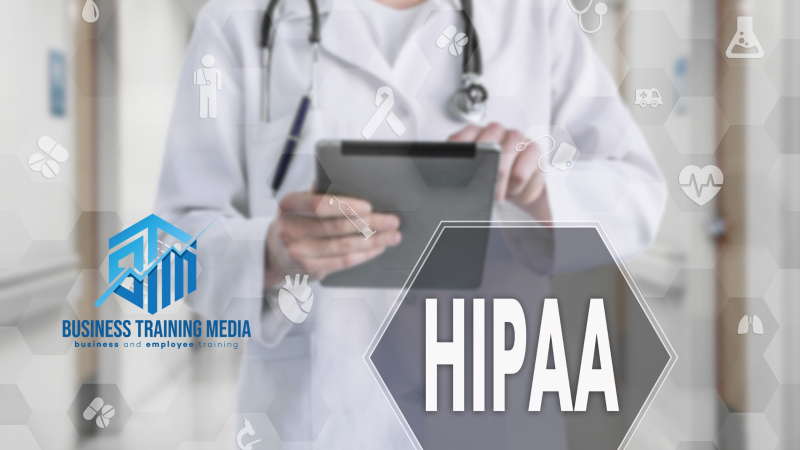
15 HIPAA Compliance Tips for Healthcare Employees
By Business Training Media
The Health Insurance Portability and Accountability Act (HIPAA) was passed in 1996 to protect and keep private people's health information. HIPAA applies to healthcare providers, insurance companies, and their business associates who handle sensitive information about patients. It includes two main rules: the Privacy Rule and the Security Rule.
The Privacy Rule sets standards for protecting the privacy of individuals' health information, also known as protected health information (PHI). It says that PHI is any health information that can be used to identify a specific person and that is sent or kept in any way, including electronically, on paper, or orally. The Privacy Rule also gives individuals the right to access their PHI and to request corrections if they believe their information is inaccurate.
The Security Rule makes rules about how to keep electronic PHI (ePHI) private, safe, and easy to access. It informs covered entities that they must put in place administrative, physical, and technical safeguards to prevent unauthorized parties from viewing, sharing, or altering ePHI. The Security Rule also says that covered entities must do regular risk assessments and have a plan in place in case of a security incident or breach.
HIPAA compliance is essential for protecting patients' privacy and avoiding costly fines and penalties. HIPAA violations can result in fines ranging from $100 to $50,000 per violation, up to a maximum of $1.5 million per year. HIPAA violations can lead to fines and legal action, and they can also hurt an organization's reputation.
Employees play a critical role in maintaining HIPAA compliance. They are in charge of handling and getting access to sensitive PHI, and they need to be trained on HIPAA rules and best practices. By following the 15 HIPAA compliance tips in this article, healthcare employees can help make sure that their organization stays in compliance and that patients' privacy is protected.
Let's review our list of the 15 HIPAA compliance tips for healthcare employees.
- Understand HIPAA regulations - The first step in maintaining HIPAA compliance is to understand the regulations. Employees must have a thorough understanding of HIPAA's privacy and security rules and how they apply to their job roles.
- Use strong passwords - Strong passwords are essential to protecting PHI. Employees should use complex passwords that include uppercase and lowercase letters, numbers, and symbols, and avoid using the same password for multiple accounts.
- Keep personal devices secure - Employees should keep their personal devices secure when accessing PHI. This includes using strong passwords, enabling automatic screen locks, and keeping devices up-to-date with the latest security patches and updates.
- Report any security incidents or breaches - Employees must report any security incidents or breaches to their supervisor or IT department immediately. This includes lost or stolen devices, unauthorized access to PHI, and suspicious activity on the network.
- Only access PHI when necessary - Employees should only access PHI when it is necessary to perform their job duties. This includes patient records, insurance information, and billing information.
- Limit PHI disclosure - Employees must limit the disclosure of PHI to only those who need to know. This includes patients, authorized family members, and healthcare providers involved in the patient's care.
- Use secure communication methods - Employees should use secure communication methods when transmitting PHI. This includes encrypted email, secure messaging apps, and secure file-sharing services.
- Properly dispose of PHI - Employees must properly dispose of PHI when it is no longer needed. This includes shredding paper documents and securely deleting electronic files.
- Attend HIPAA training sessions - Employees should attend HIPAA training sessions regularly to stay informed about any changes to the regulations and to reinforce the importance of HIPAA compliance.
- Follow policies and procedures - Employees must follow their organization's policies and procedures regarding HIPAA compliance. This includes policies for accessing PHI, sharing PHI, and reporting security incidents.
- Avoid discussing PHI in public areas - Employees should avoid discussing PHI in public areas, such as elevators, waiting rooms, and cafeterias. This includes not discussing PHI over the phone in public areas.
- Verify the identity of individuals requesting PHI - Employees should verify the identity of individuals requesting PHI before disclosing any information. This includes confirming the individual's identity over the phone or in person.
- Protect PHI during transport - Employees should protect PHI during transport by using secure methods, such as locking documents in a secure briefcase or using encrypted email.
- Use secure networks and devices - Employees should use secure networks and devices when accessing PHI. This includes using VPNs when accessing PHI remotely and using secure devices that are compliant with HIPAA regulations.
- Be aware of HIPAA violations - Employees should be aware of HIPAA violations and their consequences. This includes fines and penalties for non-compliance, as well as potential legal action and damage to the organization's reputation.
In conclusion, it is important to stay in line with HIPAA rules to protect the privacy and security of PHI. Employees are a big part of staying in compliance with HIPAA, and it's important that they know the rules and follow best practices for handling and getting sensitive information.
By following these 15 HIPAA compliance tips, employees can help make sure their company stays in compliance and avoids fines and penalties that can be very expensive.
For HIPAA training videos and resources, visit Business Training Media’s website, where you’ll find over 4,500 training courses and resources on hundreds of topics.
© Copyright 2023 - Business Training Media, Inc.
HIPAA and Confidentiality Overview Online Course
In this course, you will be introduced to the Health Insurance Portability and Accountability Act (HIPAA). The content will focus on the specific patient information that is subject to legal restrictions while highlighting the importance of maintaining patient confidentiality.






